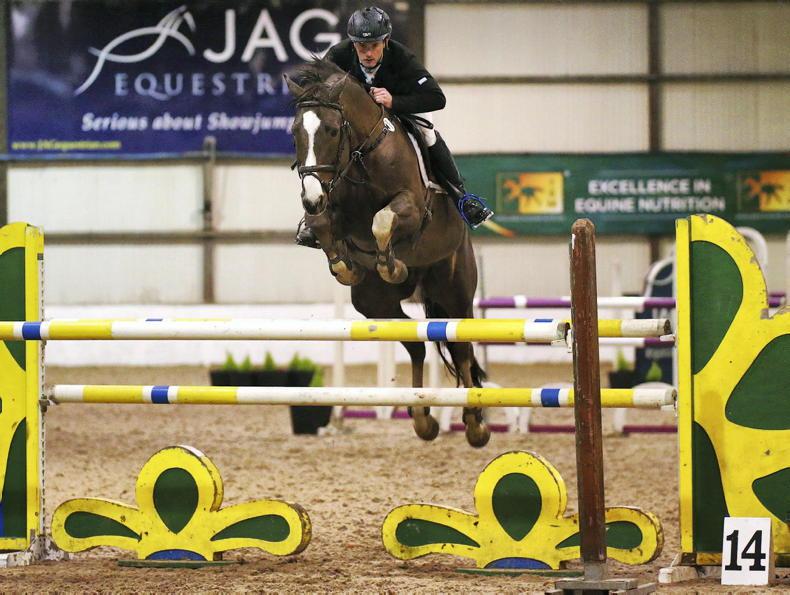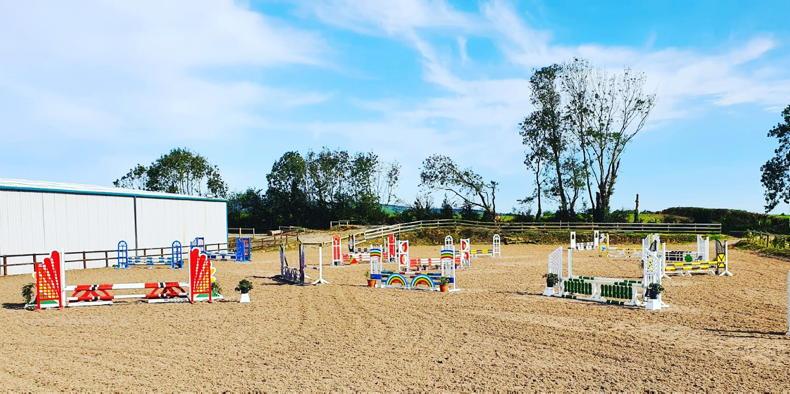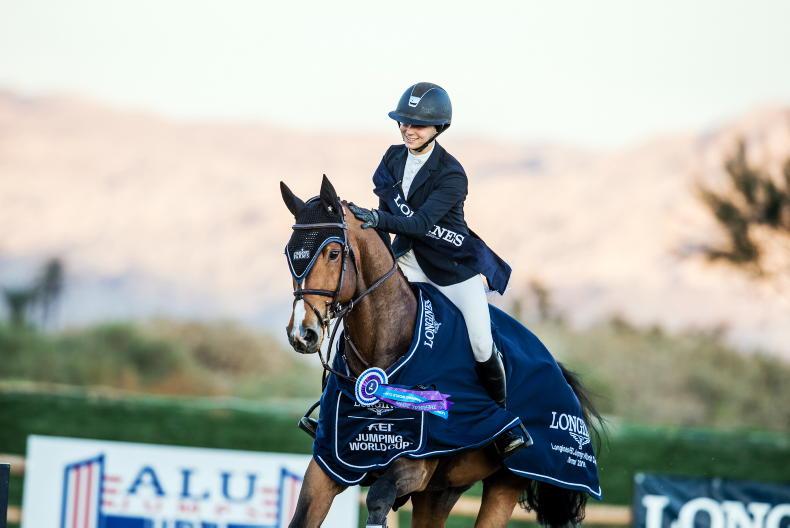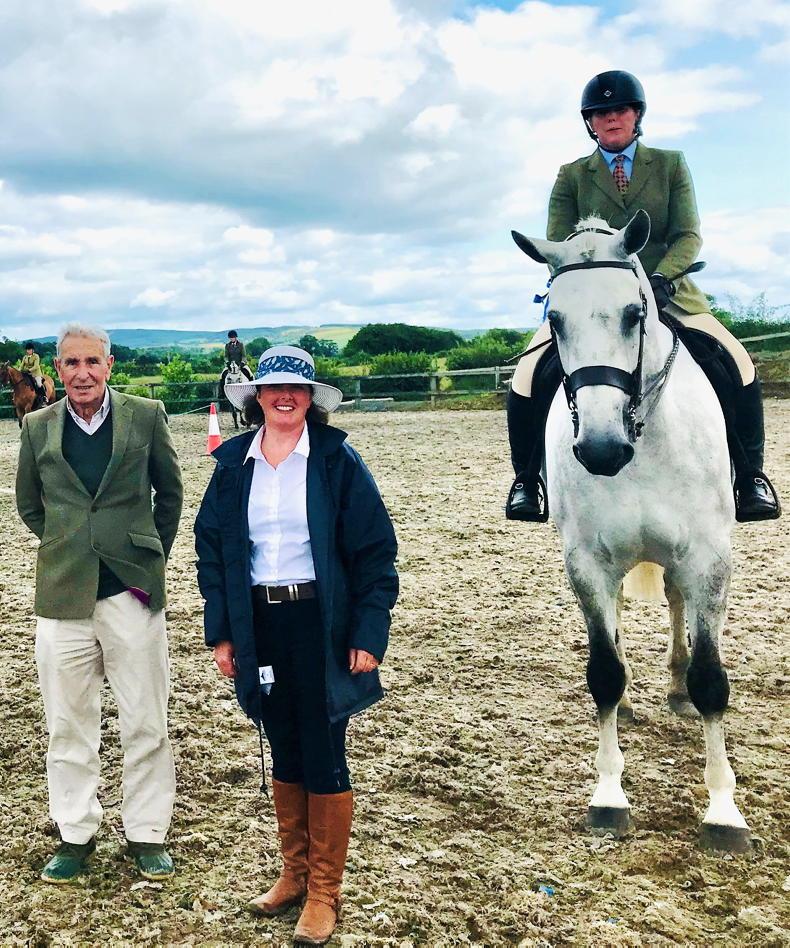“IT WAS practically non-existent, there was very little happening for nearly a full year with lockdown,” said David Maher, looking back on one of the toughest 12 months for equestrian centres. This year has seen several centres faced with spiralling costs, make the regretful decision to wind down the riding lessons part of their business.
Of the many financial and red tape hurdles faced by any young person setting up a business, dealing with a global pandemic was unimaginable back when the newly qualified Maher started giving lessons on the family farm in Golden Grove.
“The ‘horse gene’ was unavoidable! Growing up, I did show jumping, went hunting, was a member of the Ormond Pony Club and after I left school, went to Thomastown to do the BHS course there,” said David.
“After that. I came home and started working with my grandfather [Sean]. He was the patriarch really. I can speak for everyone in the family in saying that he and my grandmother Peggy had a massive influence.
“They were fantastic grandparents to have in every aspect, from those early life lessons onwards. I spent countless hours with him helping out in the yard or going round with him in the Beetle!”
Sean Maher’s famous Volkswagen Beetle workhorse was vividly described last week by David’s father Eugene. Eugene recalls a memorable conversation with Sean. “It [equestrian centre] had nothing to do with me, believe it or not! Well, I suppose indirectly it had. My dad came to me a few years before he died and said ‘I’m going to leave you the place’.
“I said ‘I hear what you’re saying, it means so much,’ and he replied ‘You were good to me.’ He wasn’t an expressive person by any means, but this was his way of saying thank you. ‘That’s fine so, that’s settled,’ he said and as he was walking out the door, turned and said ‘By the way, you might think of the other lad [his grandson David], I think he has a future in horses.’ I gave him a commitment then that it would be David’s.
“He came back from Thomastown and tipped away here, starting off by doing childrens lessons during the weekend, breaking a couple of horses and getting support from a couple of nice people in the way of livery.
“There was definitely a gap in the market for an equestrian centre, even though Roscrea is quite a small town. We don’t live beside a large city but that can have its advantages. People are that much more in touch with rural life and have direct experience from their own families. Some parents just never had the opportunities to do much themselves with ponies but got their kids into ponies instead.”
“There seems to be a good mix between the town dweller and the rural person between the kids that come for lessons. One cohort is learning from another,” added Eugene.
“We were living up in Johnstown, near Naas, at the time and one day David said ‘I’ve a man coming with steel, I’ve bought a large indoor school.’ I was home that weekend and there was all the support steel up already!”
Silver lining
From the original green field site, Roscrea Equestrian Centre has grown to include that completed 20,000 square foot indoor arena, four outdoor arenas and a cross-country course, all set on 22 acres.
“We finished it [the indoor arena] exactly 15 years ago this month,” David noted. “We’re very lucky, the indoor school is a big help for those wet winter weekends but when the sun starts shining or if it’s dry, everybody wants to be outdoors.
“We have four arenas now, we have forestry down the road for hacking through and we’ve an all-weather cross-country which is fantastic for the kids. They like jumping natural fences and splashing through the water.”
“The fact that we’ve such variety is a big plus because kids nowadays can get bored so fast! Even though we’ve plenty of variety, the most important thing is their safety obviously but if they enjoy it, they will keep coming back and you can’t beat time in the saddle.
“There’s a number of kids that help with the lessons and they’re great, they’ve very enthusiastic and keen to learn,” he added.
“I’ve jumped in Grand Prix classes here but in order to do that successfully, you have to be out there every weekend and be consistent and that would be impossible for me to do. I still compete, I still enjoy it but you have to get the work done as well.
“At the moment I feel that we have a facility to cater for everyone, from grassroots pony riders just starting out to amateur and riding club members and also, professional equestrians whether it’s training young or experienced horses. We’ve developed the centre for anyone to hopefully enjoy the sport and their horses at any level.
“Going forward we would love to host some bigger events but always keeping in mind our core business.”
The SJI database always proves a goldmine when looking at horses competed by riders and David Maher’s list is an interesting one. Stallions such as All The Diamonds, Carrabawn Cross, Portlaoise First Tuch and Royale Cruise are among just some he has produced. Another stallion is Tullibards Benny’s Legacy.
“I was lucky enough to break and compete him as a four-year-old,” he said about the since-gelded Lupicor 13-year-old, now competing as Benny’s Legacy on the US circuit with Adrienne Sternlicht.
“He’s won two World Cup qualifiers with her so that was nice. I was riding him for Hans [Kuehnle] and always had a feeling that he was going to be a very good horse.”
There’s no ‘that could have been me’ regrets about the successful 1.60m performer. “If I was still riding him, he’d never have got the chance to be doing what he’s doing now! The very, very best of luck to him, I’m delighted to see him going so well.”
The Emerald van’t Ruytershof-Cruising youngster Golden Grove Columbia is regarded as “probably the best horse I had. He was a very good horse and jumped clear in a couple of Grand Prix classes at six years of age. He died of an injury and that was very sad.”
“He had massive potential,” agreed Eugene.
Despite the unfortunate loss this summer of that promising horse, business has picked up. “To be fair, since the lockdowns were ended, there has been much more focus on outdoor activities. That’s the kind of silver lining to the pandemic for us.”
Their Saturday winter show jumping league is underway, then apart from the bread-and-butter business of lessons, the Centre runs pony camps, Dressage Ireland and riding club competitions.
“We have our own club now: Golden Grove Riding Club. They’re a fantastic bunch of people, really enthusiastic. We’ve a lot of fun, that’s really important and we just have a great time with the members. We had riding club events this year and then there was the amateur of the year show in September.”
Loyalty card
Another event hosted this summer was the North Tipperary show, the brainchild of Jennifer Haverty. “Jenny is very loyal. She comes in and helps out now with the show jumping on Saturday,” said David gratefully.
For her part, Jennifer sings the praises of the Mahers. “The centre facilities are a real credit to David. He has identified what the local and surrounding equine market needs are and has built a centre that caters for so many different levels of riders.
“I love going to David for lessons, he is so patient and sympathetic to the rider and horse and shares his knowledge willingly. The key is he explains the technical parts in a language that everyone understands and it’s one of the reasons he has a lot of local riding clubs using the facilities and availing of lessons.
“David’s parents Eugene and Olivia are fantastic and regularly help out, which is great to see as the Maher name is renowned, not only for the Golden Grove ponies but the contribution they make. I genuinely couldn’t compliment David and the centre enough.”
Loyalty goes both ways. “He seems to have this knack of generating loyalty. I see it in the repeat customers. Then there’s the fact that he’s jumping regularly on the Grand Prix circuit, he’s applying the standards of what’s required. Just today, David finished a new surface on the latest arena. There’s all new surfaces on all the arenas now,” a proud Eugene pointed out.
“Surfaces play a big part of it, it’s a tree with many branches. You’ve to have nice surfaces, nice fences, plenty of room, good facilities, parking is a big thing too. Then you try to have everything as clean and tidy as possible,” he added about buildings and fencing that drink paint and creosote.
Despite Roscrea being a designated Heritage Town, he confirmed no grants were allocated by potential sources, such as the-then Bord Failte or LEADER funding, when he was building the Centre.
“We never got a penny, totally self-funded. Every cent that went in was doubled up with blood, sweat and tears! I had young horses coming through but never really had the chance to hold on to them because you had to pay the bills.”
What about the lure of a salaried job on the Florida circuit or in a European yard? “Not really. I knew what I wanted to do and where I needed to be and that was Roscrea. I knew that I wanted to progress the business I’d started in my early 20s, so I decided to concentrate on that.
“I suppose I would have liked to have done more competing when I was younger but I wanted to build something more tangible for the future too and to build a business that Ellie could fall into if she wanted, so that’s why I decided to start up the riding school.”
His daughter Ellie pops in on the group call to chat about her three ponies; the favourite Kevin, Dermot and Ruby Eile. “She’s eight and pony mad, she’s lucky she has a few different ponies to choose from. I don’t put her under pressure. I let her make up her mind when and what she wants to do.”
The same laidback approach applies to the business her father has built up. “It would be an option for her to run the centre as a sideline after college, that’s the ideal scenario,” said Eugene.
What makes a good instructor? “I think you need to be very understanding. Both adults and kids have such different levels of ability and confidence. A lot of the time there’s some anxiety and stress attached. If you can tap into that at all, it’s a big advantage to help them progress and improve.”
The first step during private lessons is for David to test drive the horse himself. “When horses are brought in for private lessons, the thing I like to do there is ride the horse first. There’s lots of things you won’t see from the ground and as well as that, to have an understanding of the person you need to have an understanding of the horse. That’s a handy tool to use.”
There’s 20 horses and ponies on-site, where does David find these four-legged riding school saints?
“I just pick them up sporadically through the years. If I find a horse that’s doing its job, I don’t sell them. The first few I bought were at the fairs, Ballinasloe, Banagher and as time went by, I just came across them.”
With steel, timber and concrete prices having shot up over the past 12 months, there is an advantage in having the ‘heavy lifting’ part of the centre’s construction completed. However, he finds that each €25 earned (the price of a group lesson) is soon swallowed up.
“I went to get some feed today and each bag was gone up €1.50 since the last time, so costs are rising all the time. Feeding the horses is quite a large bill but it’s the cost of keeping your facilities maintained and trying to improve them, they’re the massive costs. Every time I would save up money, it would be spent to start a new project, putting every penny into the centre at all times of the year.”
For all the financial pressures, there’s an upside to the business. “Anybody that’s involved in horses as a full-time career knows that you won’t get anywhere unless you’re prepared to put in the work and it is a tough, tough business.
“It’s not a nine to five, Monday to Friday life but not only do I love the industry for the horses and the sport itself, but I love this industry for the community of people that’s in it as well.
“You don’t get to see those type of people in many other spheres or careers. A lot of the time the rewards are very small and very intermittent, they do it because they love the sport. I’ve some fantastic friends, I couldn’t thank them enough, the people that come here and support us.”
Always keen to upgrade and re-invest in the centre, another side project is a new website on the horizon. And speaking of faraway horizons, a non-busman’s holiday is wisely built into his year.
“I didn’t do much travelling in my 20s but when things came together I was able to take a little more time off. I love travelling. I go to places that are a little more off the beaten track; Costa Rica, India, Vietnam, I’m planning on going to Columbia in January... if we can travel.
“I try to go in January, that’s the only time of the year it’s quiet. It’s important for me to have that bit of balance between the horses and travel. Otherwise you’ll never get a day off in Ireland, I’d have to hide in a jungle in central America with the phone switched off to get a day off!”
Then back to developing his core business. And there’s one other project waiting.
“I’ve been threatening to do a children’s storybook with illustrations, about little escapades with my grandfather. If I had the time. There’s a couple of stories that would go down well with kids.”
Tales of Grandad and a Volkswagen Beetle. That would be a good read.
Next week: The Golden Grove cousins.




 This is a subscriber-only article
This is a subscriber-only article
 It looks like you're browsing in private mode
It looks like you're browsing in private mode









SHARING OPTIONS: